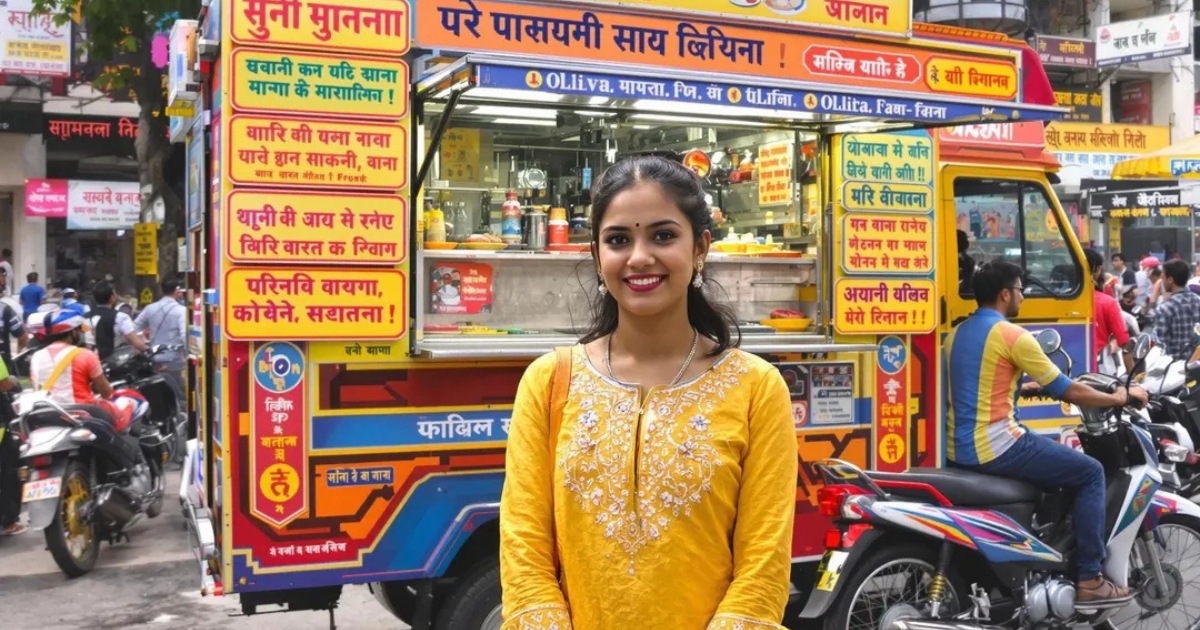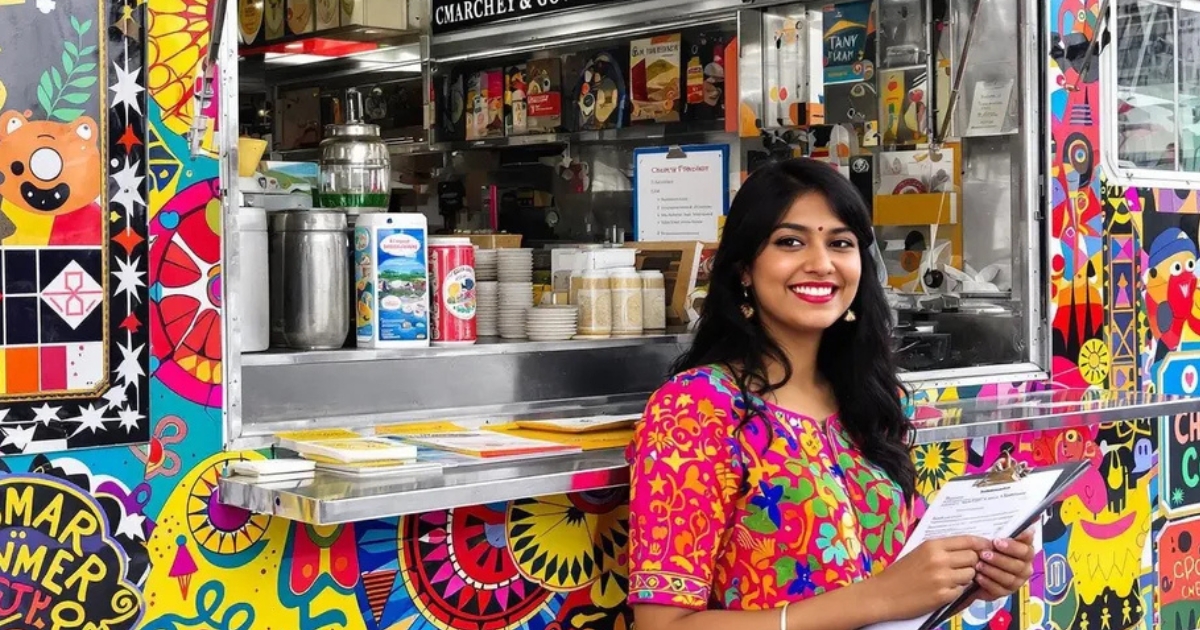Starting a Food Truck Business in India: A Complete Roadmap for Success
 The food truck business in India is rapidly gaining popularity as an affordable and flexible alternative to traditional restaurants. With urbanization and a growing appetite for diverse cuisines, food trucks are becoming a preferred choice for entrepreneurs. According to recent reports, the Indian food services market is expected to grow at a CAGR of 9.6% by 2025, presenting a lucrative opportunity for aspiring food truck owners.
The food truck business in India is rapidly gaining popularity as an affordable and flexible alternative to traditional restaurants. With urbanization and a growing appetite for diverse cuisines, food trucks are becoming a preferred choice for entrepreneurs. According to recent reports, the Indian food services market is expected to grow at a CAGR of 9.6% by 2025, presenting a lucrative opportunity for aspiring food truck owners.
Why Starting a Food Truck Business in India is a Smart Move

The food truck business involves serving freshly prepared meals, snacks, or beverages from a mobile vehicle. This industry is thriving in India due to changing lifestyles, increased urban mobility, and the growing demand for affordable yet high-quality food options. Entrepreneurs benefit from low operational costs, scalability, and the ability to cater to a wide audience. For those looking for expert assistance, explore our India company incorporation services.
Reasons to Start This Business

- High demand for quick, affordable, and diverse food options in urban areas.
- Lower initial investment compared to opening a brick-and-mortar restaurant.
- Flexibility to change locations and cater to different audiences.
- Government initiatives supporting small businesses and street food vendors. Learn more about these opportunities with our guide to start a business.
Why You Should Start a Food Truck Business in India

India’s growing urban population and evolving food culture make it an ideal market for food trucks. The country offers a favorable environment with affordable labor, accessible raw materials, and a large customer base. Success stories like those of popular food trucks in metropolitan cities highlight the potential for profitability and growth in this business. For more insights, refer to our India company registration guide.
Detailed Steps to Establish Your Food Truck Business

1. Pre-establishment Phase
Conduct thorough market research to identify your target audience and understand their preferences. Analyze competitors to determine what works and what doesn’t in your chosen area. Decide on a unique selling proposition (USP) that sets your food truck apart, such as a specific cuisine or theme. Choose an ideal location with high foot traffic, such as business districts, college campuses, or event venues.
2. Business Setup
Choose the legal structure for your food truck business, such as sole proprietorship, partnership, or LLP. Register your business with the appropriate government authorities and obtain necessary documentation. For professional guidance, explore our incorporation services in India. Purchase a food truck that meets your operational needs and complies with local safety standards. Equip your truck with essential kitchen appliances, storage facilities, and branding elements.
3. Operational Planning
Allocate resources effectively by creating a budget for inventory, salaries, and maintenance. Hire skilled staff, including chefs and support personnel, and provide them with adequate training. Implement technology solutions like POS systems and inventory management tools to streamline operations. Use advanced human resource management software for efficient staff management. Develop and document standard operating procedures (SOPs) to maintain consistency and quality in your services.
4. Marketing and Business Development
Build a strong brand identity by designing an attractive logo, menu, and truck exterior. Leverage digital marketing channels, such as social media and food delivery apps, to reach a wider audience. Partner with event organizers, local businesses, or community groups to expand your network and attract customers. Encourage customer reviews and feedback to improve your offerings and build loyalty. For professional financial management, consider using AI accounting software.
Local Regulations and Licensing

Starting a food truck business in India requires compliance with various local regulations and licensing requirements. Ensure you meet the following:
- FSSAI License: Obtain a food safety license from the Food Safety and Standards Authority of India.
- Vehicle Registration: Register your food truck with the Regional Transport Office (RTO) and ensure it meets safety and emission standards.
- Trade License: Secure a trade license from the local municipal corporation to operate in your chosen area.
- Fire Safety Certificate: Obtain a fire safety certificate to ensure your truck is equipped with fire extinguishers and other safety measures.
Additionally, comply with waste management guidelines, employment laws, and insurance requirements to safeguard your business and employees. For expert assistance, consult our business advisory services.
Challenges and Considerations

While the food truck business offers numerous opportunities, it also comes with challenges. Entrepreneurs must address the following:
- High competition in popular locations and the need to stand out with unique offerings.
- Maintaining food quality and hygiene standards in a mobile setup.
- Navigating complex licensing and regulatory requirements with the help of company secretary services.
- Adapting to seasonal fluctuations and customer preferences.
To overcome these challenges, focus on innovation, customer engagement, and building a strong brand presence.
Financial Planning Aspects

Effective financial planning is crucial for the success of your food truck business. Here are some key considerations:
- Initial Investment: Budget for the cost of the food truck, kitchen equipment, licenses, and branding.
- Operating Costs: Factor in expenses like fuel, raw materials, staff salaries, and maintenance.
- Funding Options: Explore loans, grants, or partnerships to finance your business.
- Revenue Projections: Estimate your monthly sales and calculate the break-even point to plan for profitability.
Additionally, consider tax implications and financial risk management strategies to ensure long-term sustainability. For bookkeeping needs, explore our bookkeeping services.
Conclusion
The food truck business in India offers immense potential for growth and profitability. With proper planning, innovation, and adherence to regulations, entrepreneurs can thrive in this dynamic industry.
Ready to Start Your Food Truck Business?
At 3E Accounting India, we specialize in helping entrepreneurs establish and grow their businesses. From business registration to financial planning, our expert team is here to guide you every step of the way. Contact us today to schedule a consultation and take the first step toward your food truck venture.
Don’t wait to turn your passion for food into a thriving business. With the right strategies and support, success is within your reach. For more insights, explore our comprehensive business plan guide to get started!


